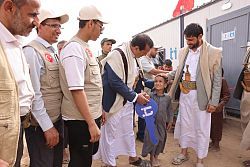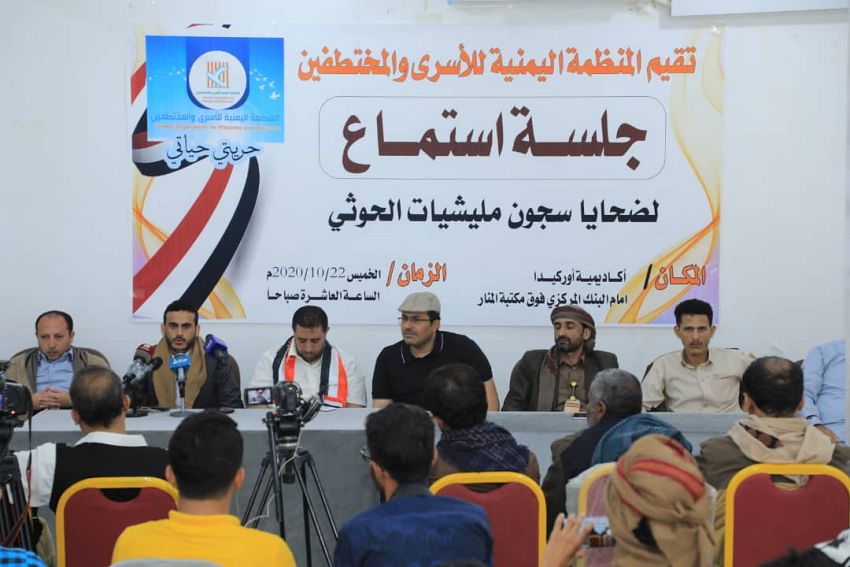
Marib Dep.G Launches Housing Project for Orphans with Turkish Funding
The Deputy Governor of Marib Governorate Dr. Abd-Rabu Miftah inaugurated a housing project for orphans from displaced families who have moved to the governorate over Houthi Terrorist Militia's war.

OCHA: Regional Escalation Directly Impacting Humanitarian Conditions in Gaza and the West Bank
United Nations Office for the Coordination of Humanitarian Affairs has warned that ongoing regional escalation is directly worsening the humanitarian situation in Gaza and the West Bank.

Korea large companies' exports rise 10 percent
Large companies' exports in South Korea rose approximately 10 percent year-on-year in the fourth quarter of last year, driven by increased global demand for semiconductors.

Saudi League: Al-Nassr, Al-Ettifaq and Neom Secure Victories Over Al-Ittihad, Damac and Al-Riyadh
Al-Nassr defeated its guest Al-Ittihad 2–0 in the match that brought them together at Al-Awwal Park Stadium in Riyadh, as part of the 21st round of the Saudi Professional League.
Last Update: ،
2026/03/05
Time
01:08:28
Latest News:
 President al-Alimi Meets with Crisis Management Committee to Review Response Options to Regional Developments
President al-Alimi Meets with Crisis Management Committee to Review Response Options to Regional Developments
 Minister of Electricity discusses with UNDP joint cooperation
Minister of Electricity discusses with UNDP joint cooperation
 Minister of Technical Education Discusses Development of Vocational Education System with UNESCO Regional ..
Minister of Technical Education Discusses Development of Vocational Education System with UNESCO Regional ..
 SPRDY signs agreement to implement agricultural value chain project in 3 governorates
SPRDY signs agreement to implement agricultural value chain project in 3 governorates
 Minister of Agriculture Discusses with UNDP Interventions in Agricultural, Fisheries Sectors
Minister of Agriculture Discusses with UNDP Interventions in Agricultural, Fisheries Sectors
Latest News:
 President al-Alimi Meets with Crisis Management Committee to Review Response Options to Regional Developments
President al-Alimi Meets with Crisis Management Committee to Review Response Options to Regional Developments
 Minister of Electricity discusses with UNDP joint cooperation
Minister of Electricity discusses with UNDP joint cooperation
 Minister of Technical Education Discusses Development of Vocational Education System with UNESCO Regional ..
Minister of Technical Education Discusses Development of Vocational Education System with UNESCO Regional ..
 SPRDY signs agreement to implement agricultural value chain project in 3 governorates
SPRDY signs agreement to implement agricultural value chain project in 3 governorates
 Minister of Agriculture Discusses with UNDP Interventions in Agricultural, Fisheries Sectors
Minister of Agriculture Discusses with UNDP Interventions in Agricultural, Fisheries Sectors
Freed prisoners set out methods of Houthi torture in jail
[22/10/2020 05:30]
MARIB - SABA
In the first session of testimony about torture in Houthi jails, recently freed prisoners set out horrific methods the theocratic militia uses.
Six prisoners who showed up in the first of a series of planned Testimony Sessions by the Yemeni Organization for Prisoners and Hostages, the prisoners freed in last week’s government-Houthi exchange deal, the prisoners said they were subjected, from the first moment in jail, to a long list of physical and psychological torture methods.
The prisoners said they were subjected to hangover, electrocution, severe assaults, kicking, striking with clubs, sleep deprivation, starvation, mock execution, execution threats, and coerced to acknowledge crimes they had not done or they would face their wives, children and mothers getting brought to the torture sessions.
The former hostages also reported stuffing inmates over capacity within small cells and detention in dark room for several months before their sudden release into brightly lit rooms to damage their nerves.
They former hostages also reported body various body fractures, dislocated spinal discs and other disabilities resulting from assaults.
Key words:
psychological - electrocution - disabilities - Organization - deprivation - acknowledge - theocratic - dislocated - government - starvation - President al-Alimi Meets with Crisis Management Committee to Review Response Options to Regional Developments
President al-Alimi Meets with Crisis Management Committee to Review Response Options to Regional Developments Minister of Electricity discusses with UNDP joint cooperation
Minister of Electricity discusses with UNDP joint cooperation Minister of Technical Education Discusses Development of Vocational Education System with UNESCO Regional Center
Minister of Technical Education Discusses Development of Vocational Education System with UNESCO Regional Center  SPRDY signs agreement to implement agricultural value chain project in 3 governorates
SPRDY signs agreement to implement agricultural value chain project in 3 governorates Minister of Agriculture Discusses with UNDP Interventions in Agricultural, Fisheries Sectors
Minister of Agriculture Discusses with UNDP Interventions in Agricultural, Fisheries Sectors Minister of Culture, Tourism Discusses Support for Peace Efforts in Yemen with Berghof Foundation President
Minister of Culture, Tourism Discusses Support for Peace Efforts in Yemen with Berghof Foundation President  Minister of Finance Discusses Enhancing Economic, Development Cooperation with French Ambassador
Minister of Finance Discusses Enhancing Economic, Development Cooperation with French Ambassador  Foreign Ministry Denounces Iran’s Attack on U.S. Embassy in Riyadh
Foreign Ministry Denounces Iran’s Attack on U.S. Embassy in Riyadh Yemen participates in Global Ministerial Conference on Tourism in Berlin
Yemen participates in Global Ministerial Conference on Tourism in Berlin "MASAM" removes 1765 of Houthis-laid landmines in a week
"MASAM" removes 1765 of Houthis-laid landmines in a week


